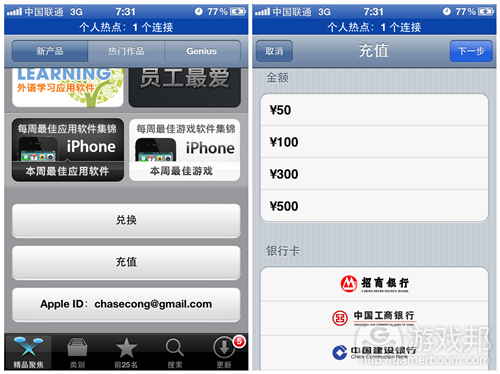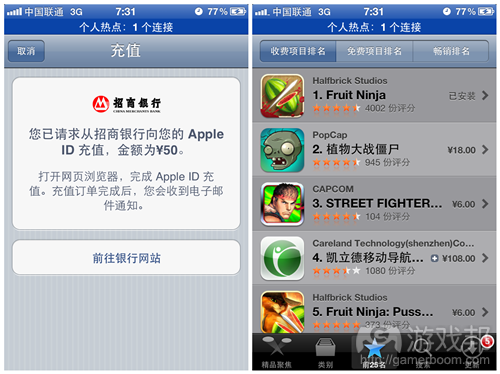苹果支持中国市场新付费渠道 能否改善开发者困境?
作者:Kathleen De Vere
过去几年来,中国迅速变成继美国之后苹果的第二大市场。
但这令开发商倍感头痛,他们需要应对盗版和低创收问题,因为中国用户的信用卡还不够普及。这个局面似乎即将发生改变。
中国版苹果应用商店除承认中国本土主要银行(游戏邦注:如中国招商银行、中国工商银行、中国建设银行及上海浦东开发银行)的银行卡外,日前开始接受人民币计费方式。用户可以在帐户中通过人民币充值50、100、300或500元。此机制与在手机或储值卡中充钱类似,但目前尚不支持Paypal等第三方支付服务。
在此之前,中国用户进行iTunes消费的唯一渠道是Visa、Mastercard、American Express及仅限于美国地区的美元,这令很多中国用户无法通过合理渠道购买应用,因为中国的信用卡普及度还很低。这带来广泛的盗版和欺骗现象,因为中国用户会通过虚假信用卡购买应用。
苹果设定的付费应用底价是6元,或者94美分(这低于当前6.36的人民币对美元汇率)。定价3.99美元、5.99美元或9.99美元的应用将分别转化成25、40和68元人民币。中国iOS开发社区代表CocoaChina(获迪斯尼思伟投资支持),它对6元底价的用户吸引力持怀疑态度。
据某中文网站文章表示,虽然新付费渠道有所帮助,但中国用户不习惯付费购买软件,他们认为几十元人民币的价格过于昂贵。
我们曾多次谈及中国的开发和营销问题。这片市场非常有潜力。据应用追踪服务公司Xyologic估计,截至10月中国地区的iPhone应用下载量达8730万次,约为美国市场同期下载量的1/5。
苹果新任首席执行官Tim Cook在公司早前的营收讨论会上表示,“中国市场的潜力很大。在此我首次见识到大批人迅速窜升为中产阶级,争相购买苹果产品。中国迅速变成我们营收榜单上排名第二的国家。”
但许多开发商在此遇到创收困境。EA PopCap Games(游戏邦注:该公司早前曾预言亚洲市场今年有望给公司创造10%的收益)表示,《植物大战僵尸》盗版游戏的销量大概是正版的5-7倍。Halfbrick Maker首席执行官Shainiel Deo表示,《水果忍者》这款热门游戏在中国的7000万销量中有一半是盗版内容,这致使该公司携手中国开发商iDreamSky推出游戏的免费广告版本。
就连免费应用在中国也面临盗版问题。此前在GDC China,DeNA Mobage高管Sun Kang表示,用户试图免费体验游戏是中国开发者面临的最大问题。据Kang表示,玩家通过盗窃或黑卡购买DeNA游戏中的付费道具是常见情况,此举令开发者陷入银行拒付的困境。
此外,盗窃现象不只停留在游戏和游戏交易活动中。Peter Vesterbacka表示,Rovio的《愤怒的小鸟》大受追捧,是在中国地区被山寨最多的游戏,这不仅导致大量复制内容的涌现,就连实体商店也充斥许多盗版周边产品,甚至还出现了未经授权的愤怒的小鸟主题公园。
PopCap Games也面临中国市场涌现大量植物大战僵尸盗版商品的问题。在他们看来,盗版对品牌而言是把双刃剑。虽然公司无法从盗版商品中获得收益,但盗版商品有助于提高品牌的知名度。有些盗版商品非常注重细节,当PopCap在官方商品上添加URL时,盗版商品也会立即出现该地址,这有能够促使新用户发现正版内容。(本文为游戏邦/gamerboom.com编译,拒绝任何不保留版权的转载,如需转载请联系:游戏邦)
China, Apple’s Second Most Lucrative Market, is About to Get Better For Developers With New Payment Options
By Kathleen De Vere
China has quickly become Apple’s second largest market by revenue after the U.S. over the past year.
But it’s still a huge headache for developers, who must cope with piracy and poor monetization because credit penetration isn’t as deep among consumers there. It looks like that may be about to change.
The local Chinese version of Apple’s app store started accepting yuan today in addition to local bank cards from some of the country’s largest banks like China Merchants Bank, Industrial and Commercial Bank of China (ICBC), China Construction Bank and Shanghai Pudong Development Bank. Consumers will be able to recharge their accounts with in 50, 100, 300 or 500 yuan increments. The system, which is similar to adding a money to the balance on a mobile phone or transit card, does not yet support third-party transfer services like Paypal.
Before today, the only way a Chinese consumer could make iTunes purchases was through Visa, Mastercard and American Express and only in U.S. dollars, which left may Chinese consumers without a way to make legitimate purchases because credit penetration is lower in the country. This contributed to widespread piracy and fraud as Chinese consumers would get fraudulent credit card numbers to buy apps.
The base price Apple is setting for paid apps is 6 yuan or 94 cents (which is actually lower than the current exchange rate of 6.36 yuan to the dollar). Developers who want to price their apps at $3.99, $5.99 or $9.99 will get converted to 25, 40 and 68 yuan respectively. CocoaChina, which represents a large community of iOS developers in China and is backed by Disney’s Steamboat Ventures, expressed some skepticism that a base 6 yuan price will be attractive to consumers.
While the new payment methods will help, Chinese consumers aren’t used to paying for software and they may consider dozens of yuan simply too expensive, according to a blog post on the site, which is in Mandarin.
We’ve covered the issue of developing and marketing apps in China in an extensive review here. The market is extraordinarily promising. App-tracking service Xyologic estimates that 87.3 million iPhone apps were downloaded in China in October or about one-fifth of the U.S.’s volume in the same time period.
“For China — the sky’s the limit there,” Apple’s new chief executive Tim Cook said in the company’s last earnings call. “I’ve never seen so many people rise into the middle class who aspire to buy Apple products. It’s quickly become #2 on our list of top revenue countries.”
But many developers have had a hard time monetizing their work there. EA’s PopCap Games, which says Asia will contribute about 10 percent of the company’s revenue this year, has told us that it sees about five to seven pirated copies of Plants vs. Zombies for every single legitimate app it sells. Shainiel Deo, who is the chief executive of Fruit Ninja-maker Halfbrick Maker, said that half of the 70 million copies of its hit app in China are pirated, which led it to form a partnership with Chinese developer iDreamSky to create free ad-supported versions of the game.
Even free-to-play apps face piracy in China. While at GDC China, DeNA’s Mobage division project manager Sun Kang said that users trying to play their games for free was far and away the developer’s biggest problem in the country. According to Kang, its a common occurrence for players to use either stolen or hacked credit cards to purchase premium items DeNA’s free-to-play games, a practice that leaves the developer on the hook for bank chargebacks.
And then, piracy doesn’t always stop at apps and in-game purchases. Rovio’s Angry Birds is so popular that it has become “the most copied” brand in China, according to Peter Vesterbacka, a phenomenon that has given rise not only to millions of pirated apps but shops filled with fake merchandise, and even for a brief time, an unlicensed Angry Birds theme park.
PopCap Games, which also sees rampant piracy for Plants Vs. Zombies-related goods in China, has told us that piracy is a double-edged sword for the brand. While the company can’t earn revenue from fake goods, piracy does help spread awareness of the brand farther. Some pirates are detailed enough that when PopCap adds URLs to its official merchandise, fake goods start appearing with the addresses too, helping new consumers discover the game.(Source:insidemobileapps)










































 闽公网安备35020302001549号
闽公网安备35020302001549号